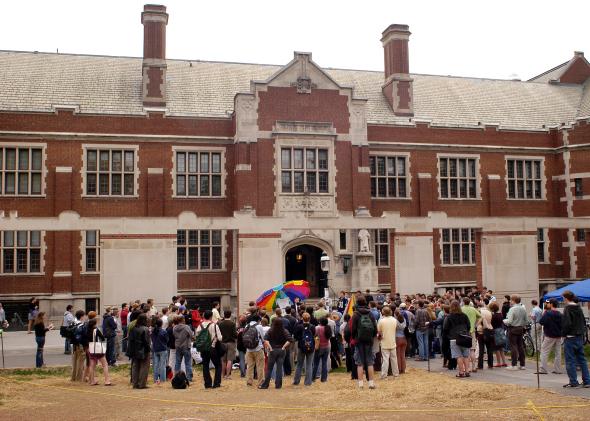The Secret World of Campus Conservative Journalism

Photo by William Thomas Cain/Getty Images
Adam Weinstein reports on the made-for-Fox controversy over an insufferable Princeton student's insufferable column about "privilege" by digging into the conservative network that funds his campus paper. In the comment section, Weinstein predicts that I will call the story a "nothingburger."
I won't go that far. It is, perhaps, a nothing-slider. The Collegiate Network and its parent organization, ISI, have existed for five decades and funneled grants to conservative campus papers. The big revelation in Weinstein's piece (ISI was founded in the McCarthy era as a "fifty-year plan" to advance conservative political causes "by implanting the idea in the minds of the coming generations") was taken directly from ISI's web site. Progressives have been writing exposes of the network ever since Dinesh D'Souza turned The Dartmouth Review into a controversy-machine, and they've been finding a broader critique since at lease 1991. It's one of those how-the-right-works narratives that gets rewritten for every generation.
And, like Weinstein writes, I was part of it. In 2000, I was a freshman at Northwestern University who happened to be assigned to the dorm where the conservative, weekly Northwestern Chronicle was put together. Like many journalism students, I preferred to write for the Daily Northwestern; getting on staff there meant getting three stories in the paper.
So, I filed one piece about exercise on campus, then pitched some coverage of a Ralph Nader rally that was coming to Chicago. Another uninterested-seeming editor was already planning a story, but I planned to bug Nader (who I'd covered at a summer campaign stop in Delaware*) for a short interview. In the end, I got one question in to Nader, but spent 10 minutes talking to Michael Moore. I returned to the office with a Moore story. The aforementioned editor gonged it.
Young, ambitious, and sort of irritiating, I immediately took the interview to the Chronicle and... well, this post is already testing the reader's limits, but I ended up running the thing for two and a half years. I wrote the grant letters that let us keep the paper running (ad revenue wouldn't have been enough) and for three years I attended Collegiate Network conferences. In 2004, I got my first paying job in D.C.—a yearlong USA Today fellowship—through the CN.
Point is, I owe it a lot, and spent many hours intimately getting to know an organ of the right. Weinstein isn't wrong—joining a CN paper meant getting an outlet for your journalism, and getting some ins if you wanted a career in this wonderful, dying field.
Here's the twist: Tal Fortgang, the "privilege" guy, is doing it wrong. The advantage of having a cushioned campus paper, if you have conservative leanings, is that you can do some reporting. The disadvantage is that you are imbued with a confidence that you should publish whatever ramblings you find insightful when you're still too young to drink or rent a car. At least one colleague at the 'Chron, who knew he wanted to enter politics, quit writing pieces after just a couple of issues for exactly that reason. Like Weinstein writes, Princeton Tory vet (and board member) Pete Hegseth helped do in his own Senate campaign by failing to build a time machine and un-write the stuff he wrote as a snotty undergrad.** Tal Fortgang is doing one hell of a self-doxxing for the employers of 2017.
*I later became an Electoral College elector for Nader's campaign. Seriously. We all did stupid things in college.
**Honestly, Hegseth's 2012 primary loss had more to do with the surging Ron Paul/Liberty movement, which got its own candidate the nomination and saw him destroyed by Sen. Amy Klobuchar.
